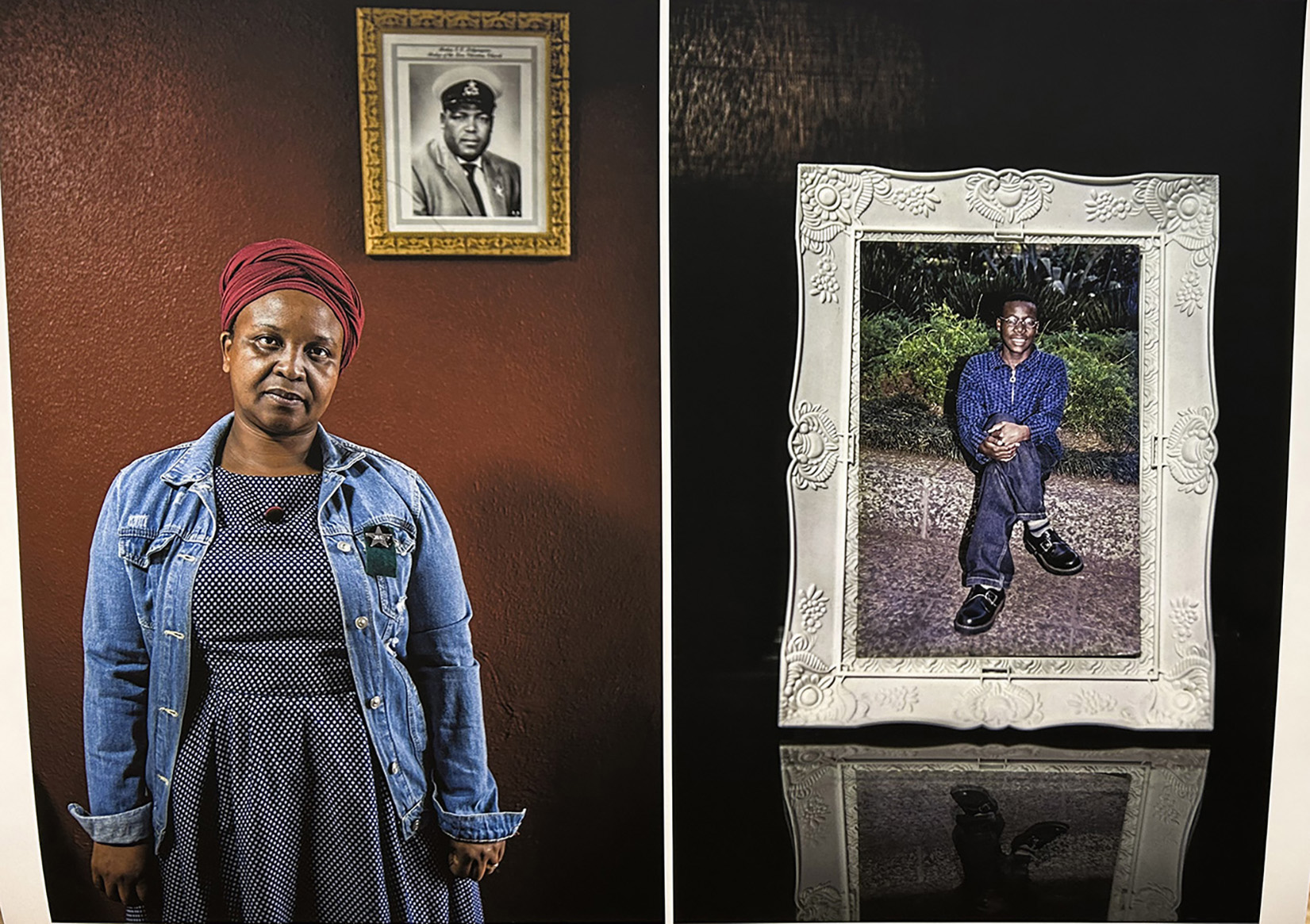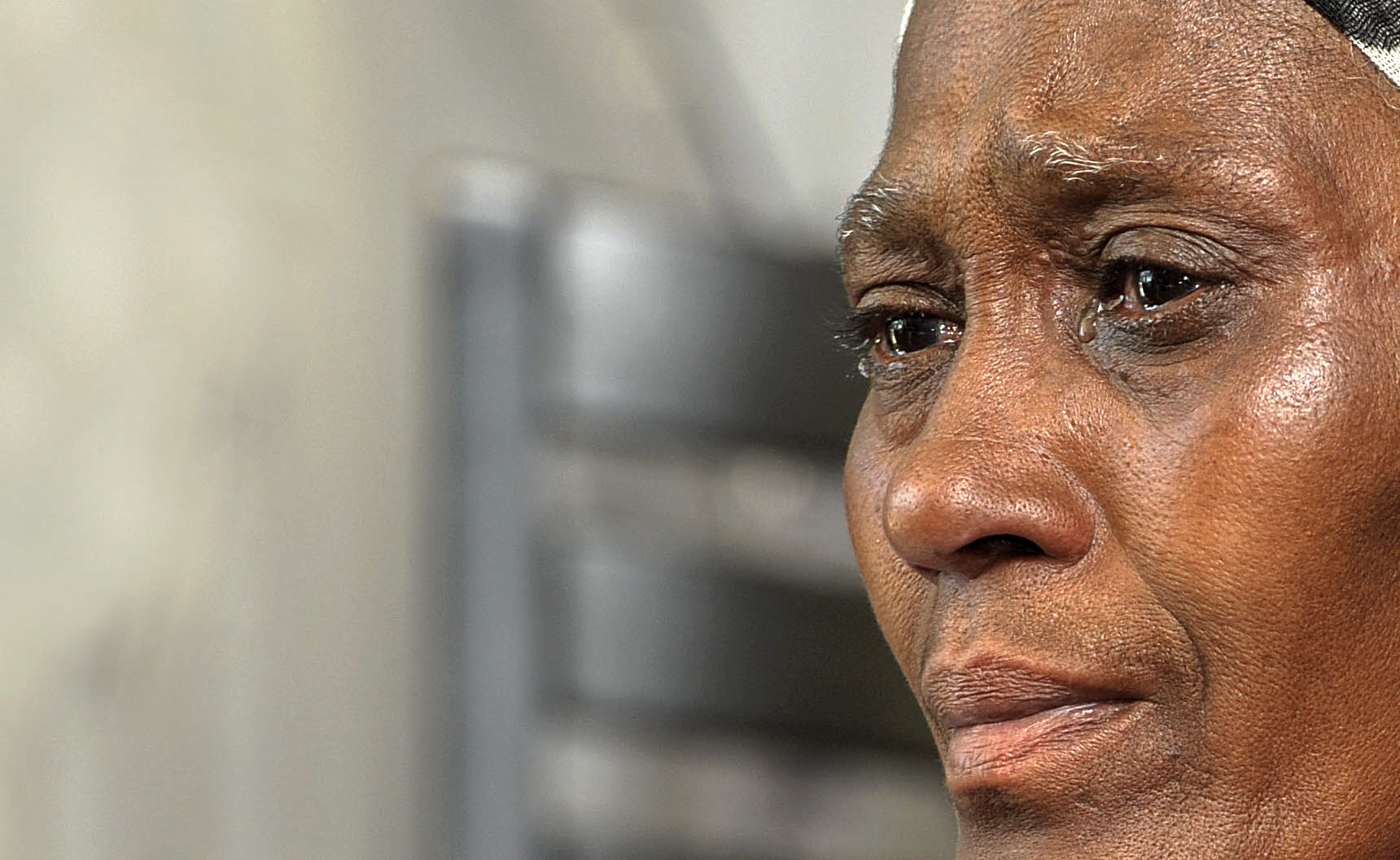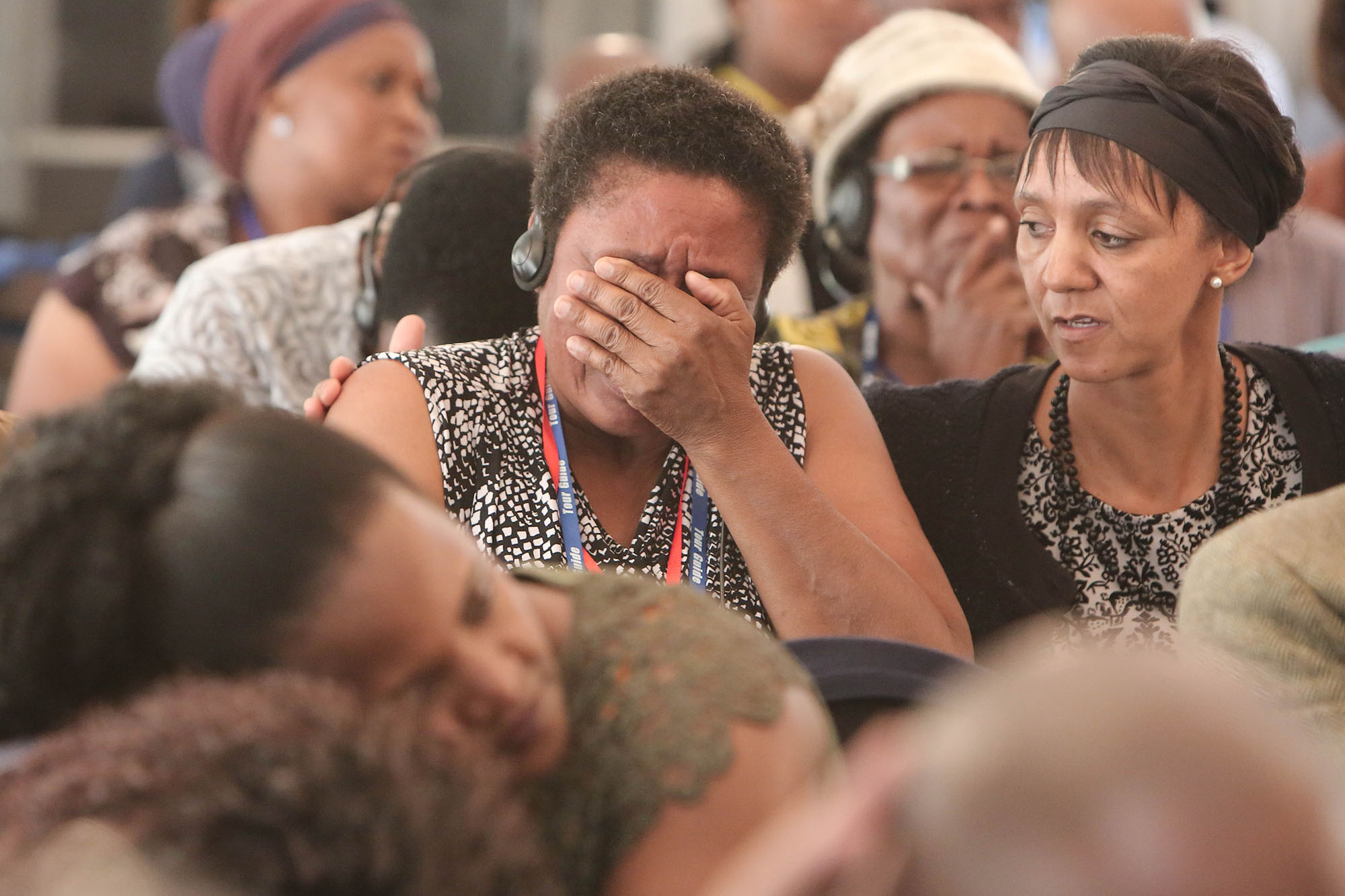The book, authored by Harriet Perlman and photographed by Mark Lewis, serves as both a tribute to the victims and a call to action, capturing the profound impact on affected families and the ongoing fight for justice and reform in South Africa’s mental health system.
‘Describing the deaths of innocent patients due to callous actions of government officials as a tragedy risks mischaracterising the nature of the events that unfolded,” said advocate Adila Hassim during the launch of Life Esidimeni: Portraits of Lives Lost at the Nelson Mandela Foundation in Johannesburg on 24 August.
Authored by Harriet Perlman with photographer Mark Lewis, it pays tribute to the people who had someone they loved cruelly taken from them in the tragedy and tells the story of those who fought back.
Hassim described a “tragedy” as an event of great suffering caused by forces beyond human control, such as fate or bad fortune.
In 2016, when 144 people with mental illness died in the care of the public health system in Gauteng – from neglect, starvation and torture after being transferred to ill-equipped, unregistered and often unsafe alternative care facilities as part of a cost-cutting move by the Gauteng Department of Health – it transcended the boundaries of tragedy.
“Those who died were unable to advocate for themselves, were unable to defend themselves, in some cases unable to speak. They were shuttled around in a state of chaos and confusion with no ally, no friend at their side, not even when they died,” Hassim said.
 Adila Hassim presents SECTION27s opening statement to the Life Esidimeni arbitration hearings in 2018. (Photo: Marius Sullivan)
Adila Hassim presents SECTION27s opening statement to the Life Esidimeni arbitration hearings in 2018. (Photo: Marius Sullivan)
“These deaths are not the result of chance or unavoidable fate, but of conscious actions or failures to act by those who were entrusted with the responsibility of protecting those individuals, of those entrusted with protecting public health.”
Hassim said Life Esidimeni was a moral failure, and a preventable injustice that depicted systemic issues and the abuse of power. Using the word tragedy to describe it can diminish the accountability of those who are responsible, she said.
The background
Rumours began circulating in June 2015 that the Gauteng Department of Health planned to end a decades-long contract with Life Esidimeni and close the facility. Civil society organisations, including SECTION27 and the South African Depression and Anxiety Group (Sadag), and the families of patients sounded the alarm that patients with mental illness would be at risk if they were moved to places without specialised care.
“The heroes of this story are the family members, and the doctors, and the organisations like Sadag, who fought tirelessly to prevent what happened. As soon as the families became aware of the plan, they appealed to government officials, they went to the media, they went to lawyers. The doctors and the psychologists did the same, but the MEC was unshakable,” Hassim said.
Their pleas fell on deaf ears and then MEC for health in Gauteng, Qedani Mahlangu, decided to terminate the contract with Life Esidimeni.
Between April and June 2016 , 1,700 mental health patients were moved from the highly specialised, long-term psychiatric care hospital to 27 unlicensed NGOs that were ill-equipped to care for them, which ultimately resulted in 144 people dying in undignified conditions.
Many patients at the those NGOs suffered severe mistreatment, including torture, abuse and punishment. In some cases they were deprived of essential necessities such as food, water, proper shelter and sanitation. Neither did they receive the necessary medication or treatments. As a result, many suffered from dehydration, secondary infections such as pneumonia, and uncontrolled seizures. The NGOs were severely understaffed, lacking trained healthcare professionals, appropriate medications, equipment and, in some instances, even basic infrastructure like beds, bedding and sanitation facilities.
 A collage of those who died in the Life Esidimeni tragedy. (Photos: Supplied by families via SECTION27)
A collage of those who died in the Life Esidimeni tragedy. (Photos: Supplied by families via SECTION27)
The aftermath
On 15 September 2016, the then Health Minister Aaron Motsoaledi asked the Health Ombud, Professor Malegapuru Makgoba, to investigate the deaths following the closure of Life Esidimeni. Makgoba’s report exposed the inhumane conditions and poor treatment at NGOs, that there were 94 unlawful deaths which had not been caused by conditions other than mental health, that all 27 NGOs operated with invalid licences, and criticised the health department for its negligence in relocating 1,900 patients.
In June 2017, former Deputy Chief Justice Dikgang Moseneke was appointed to mediate an alternative dispute resolution between the government and the families of the deceased and survivors, represented by SECTION27, following the ombud’s recommendations.
Hassim recalled the number of times Moseneke asked the officials who came to testify in the arbitration why:
“Why did you have to shut it down? Why did you have to move so many patients? Why did you have to do it in such a short space of time? Not a single one of the officials who testified in the arbitration and, for that matter, in the inquest, were able to answer the question, and that is a question that remains to be answered.”
Read more: Behind the Life Esidimeni headlines is the suffering of human beings who deserved better
Hassim said accountability and compensations were important when it came to the arbitration and Moseneke found in favour of the families.
“It was good, the outcome, but it only went so far. It wasn’t any real, in my respectful opinion, accountability, because throughout the process the officials continued to deny responsibility. There was just finger pointing and blame shifting [...]”
The National Prosecuting Authority (NPA) opted not to institute prosecution and public pressure resulted in the inquest to determine liability and cause of the deaths of the 144 people.
 Jabulile Hlatswayo and her late stepson, Sizwe Hlatswayo. (Photo: Mark Lewis)
Jabulile Hlatswayo and her late stepson, Sizwe Hlatswayo. (Photo: Mark Lewis)
 At the Life Esidimeni healing ceremony, Suzen Phoshoko’s portrait is displayed next to a photo of her nephew, Terence Chaba, who died during the Life Esidimeni marathon project. (Photo: Zukiswa Pikoli)
At the Life Esidimeni healing ceremony, Suzen Phoshoko’s portrait is displayed next to a photo of her nephew, Terence Chaba, who died during the Life Esidimeni marathon project. (Photo: Zukiswa Pikoli)
 Phumzile Motshegwa and her late brother, Solly Mashigo. (Photo: Mark Lewis)
Phumzile Motshegwa and her late brother, Solly Mashigo. (Photo: Mark Lewis)
The inquest began in 2021 and SECTION27 argued for culpable homicide charges to be brought against Mahlangu, former Gauteng mental health head Dr Makgabo Manamela, and the owner of the Precious Angels NGO, Ethel Ncube.
Two years after the inquest started, Judge Mmonoa Teffo found that Mahlangu and mental health director Manamela can be held responsible for the deaths of nine Life Esidimeni patients – Matlakala Motsoahae, Virginia Machpelah, Terence Chaba, Frans Dekker, Charity Ratsotso, Deborah Phetla, Lucky Maseko, Josiah Daniels and Koketso Mogweran.
Teffo judgment leads to proper accountability
Hassim concluded her address by quoting the Teffo judgment:
“Ms Mahlangu proceeded to terminate the contract between the Life Esidimeni care centre and the Gauteng Department of Health, despite numerous expert advice and warnings from the professionals in mental health and stakeholders.
“The deceased were further moved out of the Life Esidimeni care facilities to NGOs which were not equipped and inexperienced to give proper and adequate care in providing the requisite mental healthcare. Her conduct led to the regrettable and unfortunate deaths, some of which could have been avoided.
“Dr Manamela hastily facilitated the implementation of the termination plan against expert advice from professionals and stakeholders. She could have saved many lives as she visited the NGOs and could see that they were not adequately equipped and some of the personnel were not adequately qualified to care for the mental healthcare users. Some of the NGOs were licensed to care for the mental healthcare users without following the prescribed process protocols.”
Read more: Life Esidimeni
Hassim said that, for her, this was closer to proper accountability.
“When you are able to name who is responsible for this tragedy that occurred, and it’s not enough to just name their names. It’s now up to our government again, it’s up to our prosecuting authorities, and this deserves prosecution.”
 Pauline Tholoane and her late brother-in-law, Isaac Tholoane. (Photo: Mark Lewis)
Pauline Tholoane and her late brother-in-law, Isaac Tholoane. (Photo: Mark Lewis)
The power of resilience and the fight for justice
The launch also included a panel discussion with author Harriet Perlman, photographer Mark Lewis, mental health activist and member of the Life Esidimeni Family Committee Christine Nxumalo, executive director of SECTION27 Sasha Stevenson and Hassim.
Cassey Chambers, operations director at Sadag, said the book provided a moving and powerful narrative built on stories of the most affected.
“But this book is not merely a chronicle of loss, but a celebration of resilience and a testimony to the courage of so many. The fight for true justice continues, and the book implores ongoing struggle for a better mental health system in South Africa, and our demand as the public and those that are impacted and affected by mental health, to do more than to never forget,” she said.
Perlman emphasised capturing both the joy and sorrow of the affected families, while Lewis highlighted the role of photographs in preserving memories, noting that many families only had ID photos of their loved ones.
 A woman is comforted during the Life Esidimeni arbitration hearing in Johannesburg on 16 October 2017. (Photo: Gallo Images / Sowetan / Alon Skuy)
A woman is comforted during the Life Esidimeni arbitration hearing in Johannesburg on 16 October 2017. (Photo: Gallo Images / Sowetan / Alon Skuy)
 Christine Nxumalo, a relative of one of the patients who died, at the Life Esidimeni hearings. (Photo: Gallo Images / Beeld / Felix Dlangamandla)
Christine Nxumalo, a relative of one of the patients who died, at the Life Esidimeni hearings. (Photo: Gallo Images / Beeld / Felix Dlangamandla)
 Family member Wilhemina Thejane at the Life Esidimeni hearings in Johannesburg. (Photo: Joyrene Kramer)
Family member Wilhemina Thejane at the Life Esidimeni hearings in Johannesburg. (Photo: Joyrene Kramer)
 Family members during the Life Esidimeni arbitration. (Photo: Gallo Images / The Times / Alaister Russell)
Family members during the Life Esidimeni arbitration. (Photo: Gallo Images / The Times / Alaister Russell)
Perlman said the project began in 2011 with a website created to archive and memorialise the families’ stories.
“What we in fact got was not only how people died, but how they lived, and for us that was really important because their loved ones were loved and they lived, and they shared their grief and their pain with us,” she said.
Perlman said it was striking how far families lived from the Life Esidimeni facilities where their loved ones were patients and yet they would travel to see them, debunking the misconception that families did not care for their loved ones in Life Esidimeni facilities.
Nxumalo said this misconception angered them and could not have been further from the truth.
“We have been trying to dispel that myth for the longest time, because it is not true. It was never true. It is not, it will never be true. We loved our loved ones, and I don’t think we would have been fighting this long if we didn’t care. So it’s quite the contrary,” she said.
What next?
Stevenson underscored the need for a clear separation between politics and health implementation, advocating for stronger oversight and accountability mechanisms.
The inquest ruling highlights that this is not just a systemic issue or a tragedy of mental health, but rather it is something that individuals are responsible for and that individuals need to pay for and the NPA must prosecute those accountable.
Stevenson said this was a crucial chance for the NPA to demonstrate its commitment to justice, especially amid growing scepticism about the criminal justice system.
“The NPA is not going to prosecute without pressure being brought to bear. I think we need to keep the pressure up. We are writing to the NPA and trying to get them to make the right decision. We need the media to keep on talking about this. We need the families to keep on raising that it's insufficient, that nobody has even been prosecuted, let alone gone to jail,” she said.
Hassim said there was a real risk that the NPA would not prosecute, and that private prosecution would take enormous resources.
“It is not okay actually, we can’t privatise even that part of our life. It should not be the private sector that takes it up, the NPA must do what it’s required to do, even if they fail. Maybe there’s a way in which we can be involved in the prosecution so that we try to secure the best outcome possible, but not to take it over. The government must do its job,” she added. DM




 Family members during the Life Esidimeni arbitration.(Photo: Gallo Images / The Times / Alaister Russell)
Family members during the Life Esidimeni arbitration.(Photo: Gallo Images / The Times / Alaister Russell) 